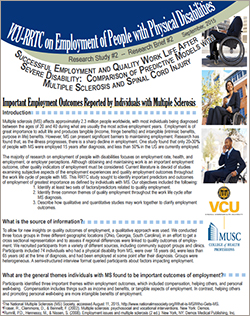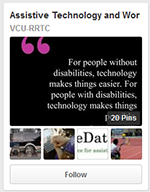VCU-RRTC 2016 Webcast Series
Register Now!
 Feb 11 (2 - 3 pm ET) Feb 11 (2 - 3 pm ET)
Title: Creating Assistive Technology Solutions in Minutes for Employment
Presenter: Therese Willkomm, Ph.D.
Job opportunities come available every day and are quickly filled. Many individuals who experience various disabilities can perform these jobs through the use of assistive technology solutions. This webcast focuses on A.T. and employment and the methods, materials and resources for creating assistive technology solutions in minutes for employment using every day items and materials. Employers and potential employees need immediate solutions to achieve successful employment outcomes.
Also included in this webcast series:
Mar 10 - Experiences and Employment of Veterans with Amputations - Presenters: Amy Armstrong, Ph.D., C.R.C., Benjamin Darter, P.T.
Apr 14 - Demand-Side Factors Related to Employer Engagement and Employment of People with Disabilities - Presenter: Fong Chan, PhD, CRC
May 12 - Identifying What People with Physical Disabilities Want and Need to Know About Employment - Presenters: Matthew Bogenschutz, Ph.D., Katherine Inge, Ph.D., O.T.R.
Jun 9 - Building Social Capital to Access Opportunities and Contribute to Our Communities: Two Self-Advocates Tell Their Stories - Presenter: George Tilson, Ed.D.
Jul 14 - A Study of Quality Employment Outcomes Among Individuals with Multiple Sclerosis - Presenter: James Krause, PhD
Aug 11 - Customized Employment as an Evidence-based Practice to Improve the Employment Outcomes of Transition-age Youth with Physical Disabilities - Presenters: Katherine Inge, Ph.D., O.T.R., Carolyn Graham, Ph.D.
Sep 8 - Employer Engagement Strategies and Effective Job Development: A Multidimensional Approach - Presenter: Nancy Brooks-Lane, M.S., LPC, LMFT
Register Online for the Entire Series (Registration is free!) |
Research Brief
Research Study 2, Research Brief 2, 2015 -
Important Outcomes of Employment as Reported by People with Multiple Sclerosis
 Multiple sclerosis (MS) affects approximately 2.3 million people worldwide, with most individuals being diagnosed between the ages of 20 and 40 during what are usually the most active employment years. Employment is of great importance to adult life and produces tangible (income, fringe benefits) and intangible (intrinsic benefits, purpose in life) benefits. However, MS can present significant barriers to maintaining employment. Multiple sclerosis (MS) affects approximately 2.3 million people worldwide, with most individuals being diagnosed between the ages of 20 and 40 during what are usually the most active employment years. Employment is of great importance to adult life and produces tangible (income, fringe benefits) and intangible (intrinsic benefits, purpose in life) benefits. However, MS can present significant barriers to maintaining employment.
Research has found that, as the illness progresses, there is a sharp decline in employment One study found that only 20-30% of people with MS were employed 15 years after diagnosis, and less than 50% in the US are currently employed.
Read the Research Brief |
Factsheet
Workplace Accommodations for Workers with Multiple Sclerosis: A Case Study Example - December 2015
 Although 98% of people with MS have employment histories and 82% were still working at the time of diagnosis, the vast majority of workers with MS disengage from the workforce before retirement age. The current rate of unemployment for people with MS in the United States has been estimated to be between 55% and 70%. The result is a disproportionately high level of unemployment among a group of both qualified and experienced workers. By their own reports, people with multiple sclerosis (MS) are gravely concerned about their long-term employment prospects. This fact sheet provides one case study example of an individual with MS who has maintained employment with the support of his employer and workplace accommodations. Read the Factsheet Although 98% of people with MS have employment histories and 82% were still working at the time of diagnosis, the vast majority of workers with MS disengage from the workforce before retirement age. The current rate of unemployment for people with MS in the United States has been estimated to be between 55% and 70%. The result is a disproportionately high level of unemployment among a group of both qualified and experienced workers. By their own reports, people with multiple sclerosis (MS) are gravely concerned about their long-term employment prospects. This fact sheet provides one case study example of an individual with MS who has maintained employment with the support of his employer and workplace accommodations. Read the Factsheet |
Research Brief
Research Study 1, Research Brief 3, 2015 -
Employment Outcomes for People with Multiple Sclerosis: Vocational Rehabilitation RSA 911 Closure Data FY 2011, 2012, and 2013
 The intent of this research brief is to profile participation, services received, and outcomes achieved by individuals with multiple sclerosis (MS) who were participants in State Vocational Rehabilitation (VR) programs. Annually, each Vocational Rehabilitation Agency funded by the Rehabilitation Act of 1973, as amended, submits to the Federal Rehabilitation Services Administration (RSA) a report, The RSA 911 Closure Report[1]. Each 911 Report contains information on individuals who terminated Vocational Rehabilitation (VR) services during an identified Fiscal Year. Read the Research Brief The intent of this research brief is to profile participation, services received, and outcomes achieved by individuals with multiple sclerosis (MS) who were participants in State Vocational Rehabilitation (VR) programs. Annually, each Vocational Rehabilitation Agency funded by the Rehabilitation Act of 1973, as amended, submits to the Federal Rehabilitation Services Administration (RSA) a report, The RSA 911 Closure Report[1]. Each 911 Report contains information on individuals who terminated Vocational Rehabilitation (VR) services during an identified Fiscal Year. Read the Research Brief |
Don't Miss This Archived Webcast!

It's not too late to watch the The Opportunity Game: How to Present Yourself as an Ideal Job Candidate archive!
In this webcast, George Tilson, Ed.D. provided job seekers with key strategies for identifying and securing jobs that are custom-fit to their aspirations, talents, and support needs.
Finding that “right job” can be daunting for most of us, whether we have a disability or not; however, having a physical disability can certainly pose unique challenges. Dr. Tilson presented the “3 Ps” to successfully attaining and retaining employment: "Prepare, Promote, and Produce."
View this video |
 Add These to Your Calendar Add These to Your Calendar
Feb 11- Creating Assistive Technology Solutions in Minutes for Employment - Register Online
Mar 10- Experiences and Employment of Veterans with Amputations - Register Online
Archived Webcasts - Did you miss one of our webcasts? Be sure to check out our 2015 Webcast Series.

 Follow us on Pinterest! Follow us on Pinterest!
|
|

